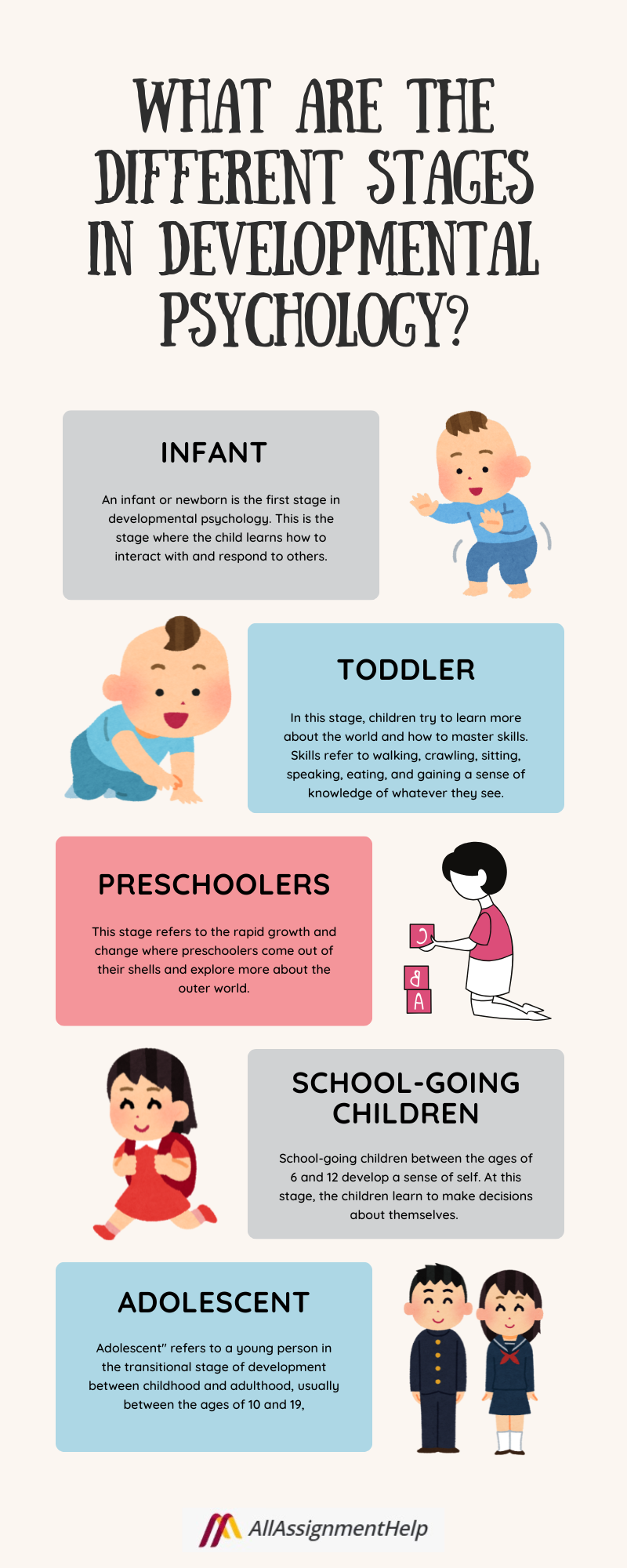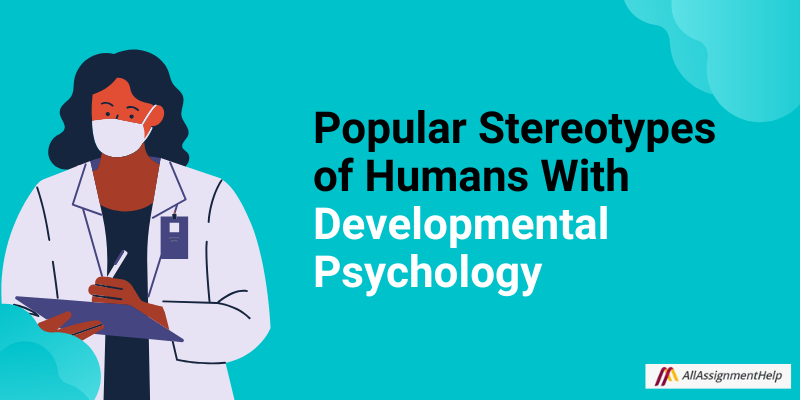Table of Contents
Developmental psychology studies how the human mind and behavior evolve as we develop. Like any other branch of psychology, it has led to lively discussions and intriguing case studies. Developmental psychology has recently changed and included positive psychology theories to provide an expansive lifetime perspective. For example, the understanding of positive psychology can improve the psychology of human development and children’s educational growth.
Students considering a degree in developmental psychology should be aware that this discipline provides an understanding of human behavior that is useful in real-world situations. However, before enrolling yourself in this course, one should know the different facets of human psychology and how people evolve throughout their lives. Read this blog of All Assignment Help to understand this fascinating area of research and learn more about how humans develop physically, cognitively, socially, intellectually, perceptually, and emotionally.
What is Developmental Psychology?
Developmental psychology is the scientific study of human transformation throughout time. It explores the changes that occur during different life stages on a physical, mental, emotional, and social level.
While childhood and adolescence are important areas of concentration, this discipline of psychology is not just focused on these phases of life. Moreover, it also looks at maturity and aging to provide a whole understanding of the human lifespan.
Students who choose this field of study don’t just study the physical changes that occur during the growth process; they also explore emotional, social, and cognitive development. If you are studying developmental psychology and human behavior and lack the knowledge and expertise to work on your assignments, make sure to get online assignment help from subject experts. Hiring professional experts is the easiest way to deal with the complexity of your assignments and guarantee good grades.
Read Here: Child Psychology – Definition, Evolution, Importance, and Basic Areas
Historical Origins of Developmental Psychology
The field of developmental psychology did not emerge until the Industrial Revolution, when the demand for a workforce with a high level of education led to the social construction of childhood as a separate life stage. Here is how the psychology of human development has originated:
- The early study comes from the Western world since it is where the concept of childhood originated.
- Developmental psychologists first wanted to better understand children’s minds to improve education and learning.
- The study of developmental changes in adulthood is much more recent. This is mostly because medical science has advanced, allowing people to live longer.
- It is believed that Charles Darwin carried out the first systematic research into developmental psychology. Based on his son Doddy’s scientific studies, he released a brief article in 1877 that described the evolution of natural forms of communication.
- In 1882, German physiologist Wilhelm Preyer released a book titled The Mind of the Child, which marked the beginning of developmental psychology as a distinct field.
- After that, three influential people, John Bowlby (1907–1990), Lev Vygotsky (1896–1934), and Jean Piaget (1896–1980) took over the discipline during the 1900s with their comprehensive theories of human development…. These three theorists have continued to impact a significant amount of modern study.
Understanding the history of developmental psychology has always been a challenge for students. They can enroll themselves in online courses that specifically focus on the historical origins of developmental psychology in detail. Also, they can earn a certification upon completion of these courses. However, earning a certification requires you to take classes regularly. If you feel the pressure of taking classes overwhelming, you can consider asking an online class helper. Hiring an expert to take your online class for you will provide you with some ease and help you earn a certificate without the risk of falling behind.
What are the Different Stages in Developmental Psychology?
There are five stages in this developmental psychology. They are infants, toddlers, preschoolers, school-age children, and adolescents. Below, we will take a quick look at these stages and the insights they offer about human development and evolution.

Infant
An infant or newborn is the first stage in developmental psychology. This is the stage where the child learns how to interact with and respond to others. As a parent, one must track their children’s progress and how they will connect with them. If an infant is not responding to what you say, then there might be a problem that needs your consideration.
Toddler
A toddler is the age group between one and three years old. It is an important stage in the development of children. In this stage, children try to learn more about the world and how to master skills. Skills refer to walking, crawling, sitting, speaking, eating, and gaining a sense of knowledge of whatever they see.
Preschoolers
This stage refers to the rapid growth and change where preschoolers come out of their shells and explore more about the outer world. This can be a crucial stage where children need proper care from their parents to engage in a variety of activities and develop new skills.
School-going children
School-going children between the ages of 6 and 12 develop a sense of self. At this stage, the children learn to make decisions about themselves. This is the beginning stage, where children try to learn from the things they see and how to respond to them. This age teaches a lot of lessons which might help students in personal development.
Adolescent
Adolescent age can be divided into three steps. The first is an adolescent between the ages of 12 and 18. This stage may teach them to overcome their mental and physical challenges and learn to be strong. The next is early adulthood, between 18 and 30 years old. Here, the individual grows up personally and learns to be independent. The third one is adults, which considers people in the age group of 30+ years. This step can provide major development, both mentally and physically.
Each person will go through these five stages in their life. This process of development will make them strong and help them adapt throughout their lives. However, there is a lot to learn about these stages in more detail, which is necessary for assignment writing. However, those who fail to understand these stages and don’t want to submit a poorly written assignment can take developmental psychology assignment help from experts. These experts will explain each stage in your assignment with proper research and diagrams.
Theories of Developmental Psychology
As the field of developmental psychology evolved throughout time, several scholars put forth theories to explain the psychology of human development. The most well-known theories of developmental psychology that you must know include:
Psychosocial Developmental Theory
The lifetime theory of psychologist Erik Erikson, which included eight phases of psychosocial development, was based on the psychosexual development theory of Austrian neurologist and psychoanalytic pioneer Sigmund Freud. A basic “crisis” (such as trust vs distrust in infancy) and an age range are associated with each stage, which must be confronted before going on to the next.
Cognitive Developmental Theory
According to the cognitive development hypothesis of Swiss psychologist Jean Piaget, children and young people eventually learn to reason logically and scientifically. According to Piaget, intellectual development occurs in four discrete phases, starting at birth and ending at age 12.
Attachment Theory
Attachment theory was first put out by psychoanalyst John Bowlby. It states that a caring, dependable, and supportive caregiver is crucial to a baby’s and child’s growth. Children might have trouble with healthy attachments as they grow older if they are unable to form such a relationship or if they suffer from parental loss or separation.
Sociocultural Developmental Theory
The sociocultural developmental theory of psychologist Lev Vygotsky explores the function of society, whereas Bowlby focused on the significance of the immediate family in a child’s development. How someone sees themselves and interacts with others can be significantly impacted by cultural influences and ideas.
If you want to learn more about these theories and how they were developed, you can enroll in an online psychology course. However, it is not easy for students to attend their online classes continuously while being occupied with other academic tasks. An online class help service can prove helpful in such a case. These services often possess a team of online class helpers whom you can ask, please take my online psychology class for me and help me complete my coursework online.
What to Do If You Get Diagnosed with a Development Problem?
You must visit a psychologist to find out whether you are going through a developmental psychology issue or not. Moreover, a perfectly trained professional can also help. Other than this, here is what you should do if you get diagnosed with a developmental problem:
Physical therapy
Physical therapy usually refers to physical training. For example, if a child is having issues speaking or not crawling at a regular age, then consulting a professional psychologist would be a wiser idea. The experts will use different physical therapies that will help them speak or crawl.
Occupational therapy
This therapy will address sensory processing and self-help issues. Occupational therapy will help improve fine motor skills. Moreover, it also plays an important part in developmental psychology by assisting people in developing and improving their abilities in everyday tasks by tackling physical, cognitive, and sensory demands to promote independence and well-being.
Speech and language therapy
The name itself suggests that it relates to sound, understanding, and reacting to vocals. Most children have issues understanding and responding to speech sounds. This therapy will help children with language and sound problems and reduce developmental delays.
Behavioral therapy
Behavioral therapy is a developmental psychology therapeutic method that is based on learning concepts. It aims to change maladaptive behaviors and encourage adaptive ones by using strategies including exposure, reinforcement, and conditioning.
Childhood special education
Early Childhood Special Education, often termed ECSE, is a service in developmental psychology. The main purpose of this service is to help children with special disabilities. The developmental psychology professional trains children who have social, mental, or physical issues.
Students who are interested in developmental psychology can also consider studying counselling psychology. Developmental psychology and counseling psychology are closely linked, as both focus on understanding human behavior across the lifespan. Developmental theories serve as a basis for counseling treatments. However, you have to write assignments whether you are pursuing a degree in developmental psychology or counselling psychology. Fortunately, there are multiple online platforms available that provide both developmental psychology assignment help and counselling psychology assignment help to assist students in excelling at their academic writing tasks and coursework.
Also Read: Top Online Psychology Courses That Will Help in Your Career Growth
Conclusion
Developmental psychology is a scientifically conducted study that deals with the changes that take place in an individual during his or her lifetime. Initially, it only studied the developmental changes in infants, but later included adolescence, aging, and complete human life. The study of developmental psychology helps professionals use an array of theories to think about and observe various aspects of human development.
Frequently Asked Questions
Question 1: What are the different causes of developmental delays?
Answer 1: Genetic or hereditary conditions, post-traumatic stress disorder, metabolic disorders, severe psychosocial trauma, and deprivation are some of the causes of depression in development.
Question 2: Are there any symptoms of delays in development? If yes, what are they?
Answer 2: Learning, speaking, or talking difficulties, inability to connect actions, failure to recognize things, lower IQ tests, and not remembering things are some of the common symptoms of developmental delays.
Question 3: What to do if someone I know is facing developmental issues?
Answer 3: The first thing is to familiarize yourself with the kind of developmental delays the person is facing. The next step is to connect with a paediatrician to intervene and provide the necessary development or treatment.
Question 4: What are the different types of developmental psychology?
Answer 4: There are four types in it. They are psychosocial developmental theory, cognitive developmental theory, attachment theory, and sociocultural developmental theory.
